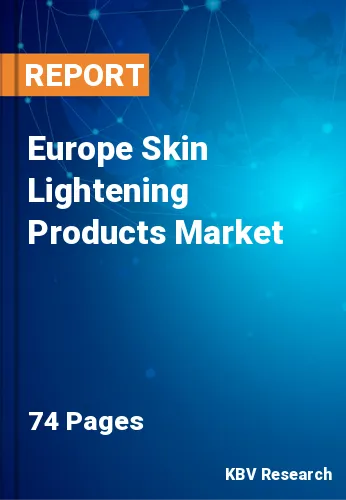The Europe Skin Lightening Products Market would witness market growth of 4.8% CAGR during the forecast period (2022-2028).
Moles and other areas of excessive pigmentation can be depigmented to resemble the surrounding skin. Corticosteroids, tretinoin, and hydroquinone are examples of effective medicines for specific locations. Attempts to lighten significant regions of skin have been documented in some cultures. This may be performed for aesthetic, political, or commercial reasons. Many skin whiteners contain ingredients such as the performance-enhancing drugs clobetasol propionate, inorganic mercury (mercuric chloride or amalgamated mercury), glutathione (an antioxidant traditionally used in cancer treatment), and the organic compound hydroquinone, which can help achieve lighter skin tones.
Overuse of topical clobetasol, which can create systemic steroid effects from regular use, particularly on broad skin regions; and hidden mercury content, which can cause heavy metal poisoning depending on personal susceptibility, are the two main health hazards associated with skin lighteners. The active ingredient in many skin whiteners is a hazardous form of mercury. As a result, its use may be harmful to one's health and is prohibited in many countries.
The rise of this region's cosmetic business will increase the market for skin lightening makeup remover in the region. In addition, the significant influence of the fashion sector and the growing rate of urbanization will increase demand for a variety of cosmetic items. The skin lightening makeup remover industry has developed in Europe as a result of rising environmental consciousness and analysis of the influence of hazardous chemicals on the skin. Organic ingredients have made headway in a wide range of products in recent years, and they've become a popular cosmetic ingredient. Customers who are willing to pay a premium for quality brands that are healthier for their skin and the environment drive the European market for skin lightening product.
In the United Kingdom, this basic advice applies to all cosmetic products available to the general public. For example, free samples and items sold or given as gifts are included in this category, as are products used by experts. Providing with information about Regulation (EC) No 1223/2009 on Cosmetics, as amended by the Product Safety and Metrology (Amendment etc.) (EU Exit) Orders 2019, is intended to assist in understanding them.
The Germany market dominated the Europe Skin Lightening Products Market by Country in 2021, and would continue to be a dominant market till 2028; thereby, achieving a market value of $683.5 Million by 2028. The UK market is estimated to grow at a CAGR of 3.9% during (2022 - 2028). Additionally, The France market would witness a CAGR of 5.6% during (2022 - 2028).
Based on Product, the market is segmented into Creams, Cleanser, Mask, and Others. Based on Nature, the market is segmented into Synthetic, Natural, and Organic. Based on countries, the market is segmented into Germany, UK, France, Russia, Spain, Italy, and Rest of Europe.
Free Valuable Insights: The Global Skin Lightening Products Market will Hit $13.5 Billion by 2028, at a CAGR of 5.3%
The market research report covers the analysis of key stake holders of the market. Key companies profiled in the report include L'Oreal Group, The Procter and Gamble Company, Unilever PLC, Shiseido Company, Limited, Beiersdorf AG, The Himalaya Wellness Company (Himalaya Global Holdings Ltd.), Kao Corporation (Kanebo Cosmetics, Inc.), Vlcc Health Care Limited, Avon Products, Inc., and Dabur India Ltd.
By Product
By Nature
By Country
Our team of dedicated experts can provide you with attractive expansion opportunities for your business.

